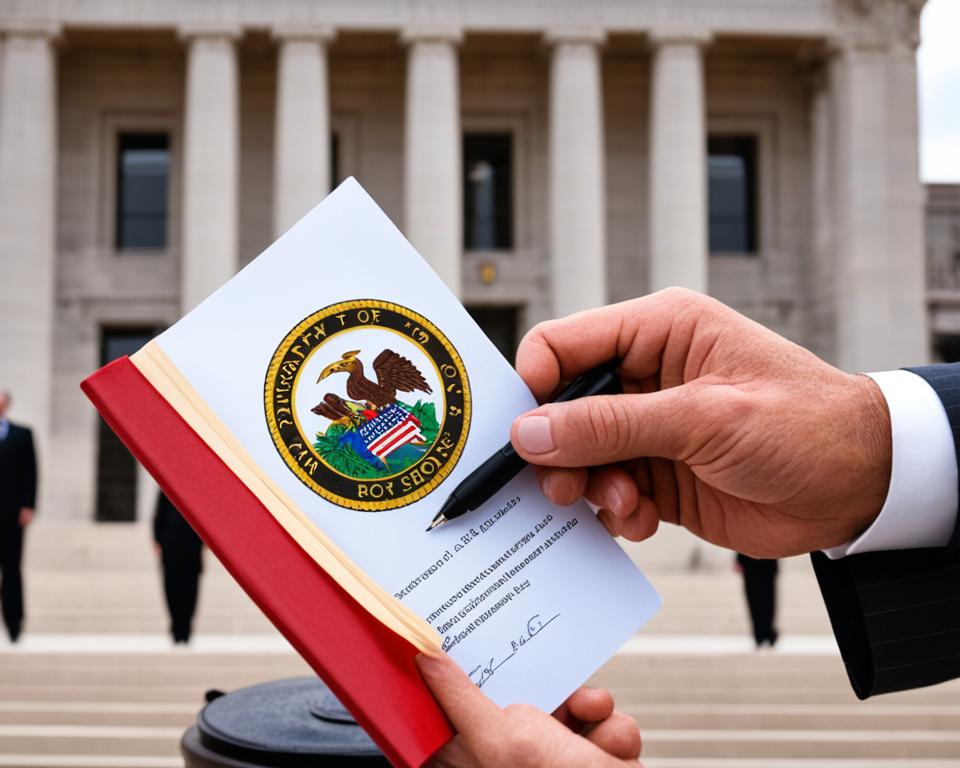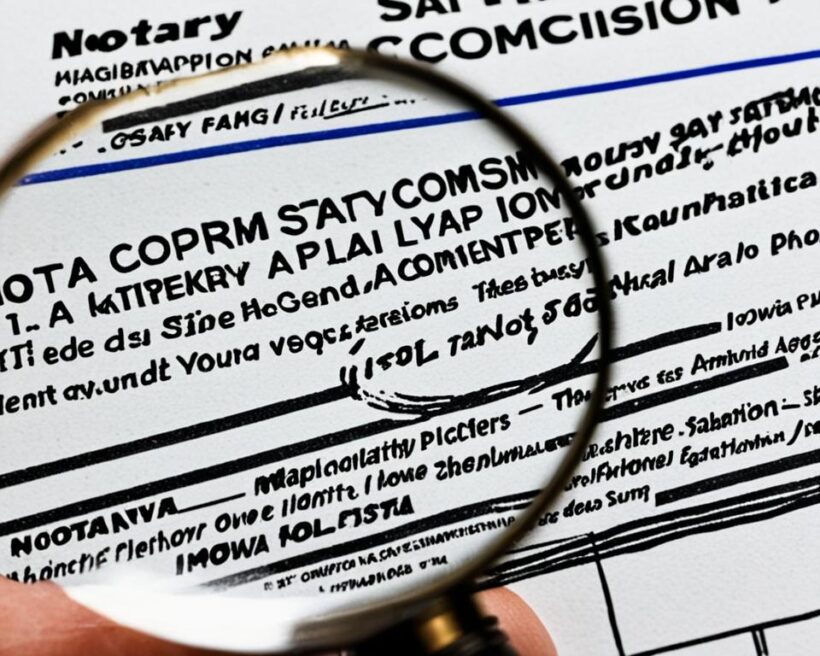Are you interested in becoming a Notary Public in Iowa? If so, you’ve come to the right place. In this guide, I will walk you through the process step by step, so you can start your journey as a trusted public official. Becoming a Notary in Iowa involves meeting specific eligibility requirements, completing an application process, obtaining necessary supplies, and considering optional steps to enhance your skills and knowledge.
First, let’s dive into the eligibility requirements. To become a Notary in Iowa, you must be at least 18 years old and either a U.S. citizen or a permanent legal resident. You should also be living or working in the state of Iowa, with out-of-state applicants being required to be residents of a state bordering Iowa. Additionally, you must be able to read and write English and have a clean criminal record without any felony convictions involving fraud, dishonesty, or deceit.
Once you meet these eligibility requirements, you can move on to the application process. The first step is filling out the Application for Appointment as Notary Public. This application serves as your oath of office and must be completed accurately. After that, you’ll need to submit the application, along with a $30 processing fee, to the Notary Division of the Secretary of State’s office. The Secretary of State will review your application, and if approved, you will receive your Notary commission.
Now that you’ve completed the application process and received your commission, it’s time to think about obtaining the necessary supplies. As a Notary in Iowa, you’ll need an official Notary seal. This seal should include your name, the words “Notarial Seal,” the word “Iowa,” and other required details. It’s crucial to choose a high-quality seal that meets the necessary standards.
While not required by law, it is highly recommended to consider additional steps to enhance your skills and professionalism as a Notary. This may include getting errors and omissions (E&O) insurance to protect yourself from potential liabilities and considering continuing education or guidance from Notary experts to stay updated on best practices.
By becoming a Notary in Iowa, you can play an essential role as an impartial witness in verifying the authenticity of documents. It’s a rewarding and respected position that can open up new opportunities. Now that you have a brief overview of the process, let’s dive deeper into each step, eligibility requirements, and necessary supplies. Get ready to embark on an exciting journey as a Notary in Iowa!
Eligibility Requirements
To become a Notary in Iowa, you must meet certain eligibility requirements. These requirements are in place to ensure that individuals serving as Notaries possess the necessary qualifications and character. By meeting these requirements, potential Notaries can demonstrate their commitment to upholding the responsibilities of this important public role.
Requirements for Notary Public in Iowa:
- Age: You must be at least 18 years old.
- Citizenship or Legal Resident status: You must be a citizen or permanent legal resident of the United States.
- Residency or Employment: You must live or work within the state of Iowa. Out-of-state applicants must be residents of a state bordering Iowa.
- English Language Skills: You must be able to read and write English fluently.
- Criminal History: You must not have been convicted of a felony involving fraud, dishonesty, or deceit.
Meeting these eligibility requirements is a crucial step in the process of becoming a Notary in Iowa. It ensures that Notaries are qualified, trustworthy, and able to carry out their duties with integrity. By upholding these standards, Iowa strives to maintain a high level of professionalism and credibility among its Notaries.

“Becoming a Notary in Iowa requires meeting certain eligibility requirements. These requirements serve as the foundation for ensuring the integrity and credibility of Notaries as public officials.”
Application Process
The application process to become a Notary in Iowa is straightforward and involves a few important steps. The first step is to fill out the Application for Appointment as Notary Public, which serves as your oath of office. This application can be obtained from the Notary Division of the Secretary of State’s office or downloaded from their website.
Once you have filled out the application, you will need to submit it along with the $30 processing fee to the Notary Division of the Secretary of State’s office. The processing fee can be paid by check or money order made payable to the Secretary of State.
After submitting your application and fee, the Secretary of State will review your application to ensure that all requirements are met. If your application is approved, you will receive your Notary commission in the mail along with instructions on how to obtain your official Notary seal.
It is crucial to follow the application process accurately and submit all required documents and fees to avoid any delays or complications. Make sure to double-check your application for any errors or missing information before submitting it.
By completing the application process correctly and thoroughly, you will be one step closer to becoming a Notary Public in Iowa and gaining the authority to perform important notarial acts.

Notary Supplies and Training
As a Notary in Iowa, I understand the importance of having the necessary supplies to perform my notarial duties. One of the key supplies that every Notary needs is an official Notary seal. This seal contains specific information, such as my name, the words “Notarial Seal,” the word “Iowa,” and other details required by the Secretary of State.
To ensure that my seal meets the necessary standards, I chose a high-quality seal from a trusted supplier of Iowa Notary supplies. This way, I can confidently perform my notarial acts and provide reliable services to my clients.
Recommended Notary Supplies
Beyond the official Notary seal, there are other supplies that can enhance your notarial duties. Here are some recommended supplies:
- Notary journal: Keep a detailed record of each notarial act to maintain accurate and organized documentation.
- Notary stamp ink: Ensure that your stamp produces clear and legible impressions by using high-quality ink.
- Embosser: An embosser can be used in conjunction with the Notary seal to add an extra layer of security and authenticity to notarized documents.
While these supplies are essential for performing notarial acts, it’s worth noting that they may not be required by law. However, having these supplies demonstrates professionalism and attention to detail, which can benefit your notary business.
Notary Training and Education
In addition to the necessary supplies, it is highly recommended to pursue training and education opportunities as a Notary in Iowa. By enhancing your skills and knowledge, you can provide even better services to your clients and ensure compliance with state laws.
“Investing in continuous learning and training has been invaluable in my journey as a Notary. It has allowed me to stay updated on changes in notarial laws, learn best practices from industry experts, and provide a higher level of service to my clients.” – Emily Johnson, Iowa Notary Public
There are various resources available for Notary training in Iowa, including online courses, workshops, and seminars. These resources cover a wide range of topics, such as proper identification, handling sensitive documents, and conducting remote notarizations.
By investing in Notary training, you can stay ahead of industry trends, build confidence in your abilities, and ultimately, provide a superior notarial experience to your clients.
Remember, as a Notary Public, professionalism and expertise go hand in hand. By having the right supplies and undergoing training, you can establish yourself as a trusted and reliable Notary in Iowa.
| Recommended Notary Supplies | Description |
|---|---|
| Notary Journal | Record and organize notarial acts for accurate documentation. |
| Notary Stamp Ink | Ensure clear and legible impressions with high-quality ink. |
| Embosser | Add an extra layer of security and authenticity to notarized documents. |
Conclusion
Becoming a Notary in Iowa is an important and rewarding process. By meeting the eligibility requirements, completing the application process, and obtaining the necessary supplies, you can become a trusted Iowa Notary Public. As a Notary, you will play a crucial role in verifying the authenticity of documents as an impartial and unbiased witness.
It’s essential to understand all the requirements and steps involved in becoming a Notary in Iowa to ensure a successful journey. From filling out the Application for Appointment as Notary Public to submitting the application and processing fee, each step is vital to obtaining your Notary commission.
Additionally, considering optional steps such as training and insurance can further enhance your skills and provide peace of mind in serving as a Notary. Remember to choose a high-quality Notary seal that meets the Secretary of State’s requirements and consider continuing education opportunities to stay updated.
By becoming a Notary in Iowa, you can contribute to the integrity and trustworthiness of legal documents and transactions. Start your journey today and become a valued member of the Iowa Notary Public community.
FAQ
What are the eligibility requirements to become a Notary in Iowa?
To become a Notary in Iowa, you must be at least 18 years old, a citizen or permanent legal resident of the U.S., and live or work in Iowa. Out-of-state applicants must be residents of a state bordering Iowa. You must also be able to read and write English and have not been convicted of a felony involving fraud, dishonesty, or deceit.
What is the application process to become a Notary in Iowa?
The application process involves filling out the Application for Appointment as Notary Public, which serves as your oath of office. Once completed, you need to submit the application along with a $30 processing fee to the Notary Division of the Secretary of State’s office. The Secretary of State will review your application and, upon approval, send you your Notary commission.
What supplies do I need as a Notary in Iowa?
As a Notary in Iowa, you will need an official Notary seal that includes your name, the words “Notarial Seal,” the word “Iowa,” and other required details. It is important to choose a high-quality seal that meets the necessary standards. While not required by law, it is recommended to have errors and omissions (E&O) insurance and consider continuing education or guidance from Notary experts to enhance your skills and knowledge.
How long does it take to become a Notary in Iowa?
The duration of the process to become a Notary in Iowa may vary. Once you have met the eligibility requirements and submitted your application and processing fee, it may take some time for the Secretary of State’s office to review and approve your application. It is advisable to plan ahead and allow for sufficient processing time.
How much does it cost to become a Notary in Iowa?
The cost of becoming a Notary in Iowa includes a $30 processing fee for the Application for Appointment as Notary Public. Additionally, there may be costs associated with obtaining a high-quality Notary seal, errors and omissions (E&O) insurance, and any optional training or continuing education you choose to pursue.
Are there any additional steps I should consider as a Notary in Iowa?
While not required by law, it is highly recommended to have errors and omissions (E&O) insurance as a Notary in Iowa. This insurance provides additional protection in the event of a mistake or negligence during notarial acts. Additionally, you may want to consider seeking training or continuing education to enhance your skills and stay up-to-date with any changes in Notary laws and practices.




